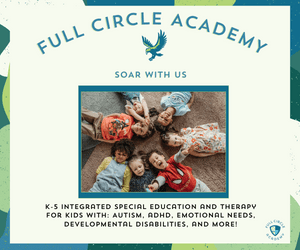Our job as parents is to help our kids grow, develop, and thrive.
And while it’s not a commonly used term in everyday life, a big part of kids’ development focuses on “Activities of Daily Living,” or ADLs as we call them in the therapy world.
What are Activities of Daily Living?
ADLs include the tasks that every individual does on a daily basis to take care of themselves and move through their day. Specifically, ADLs include:
- Moving from one place to another (crawling, walking, general movement)
- Eating
- Getting dressed
- Bathing
- Personal hygiene/grooming (brushing your teeth, washing your face, etc.)
- Toileting
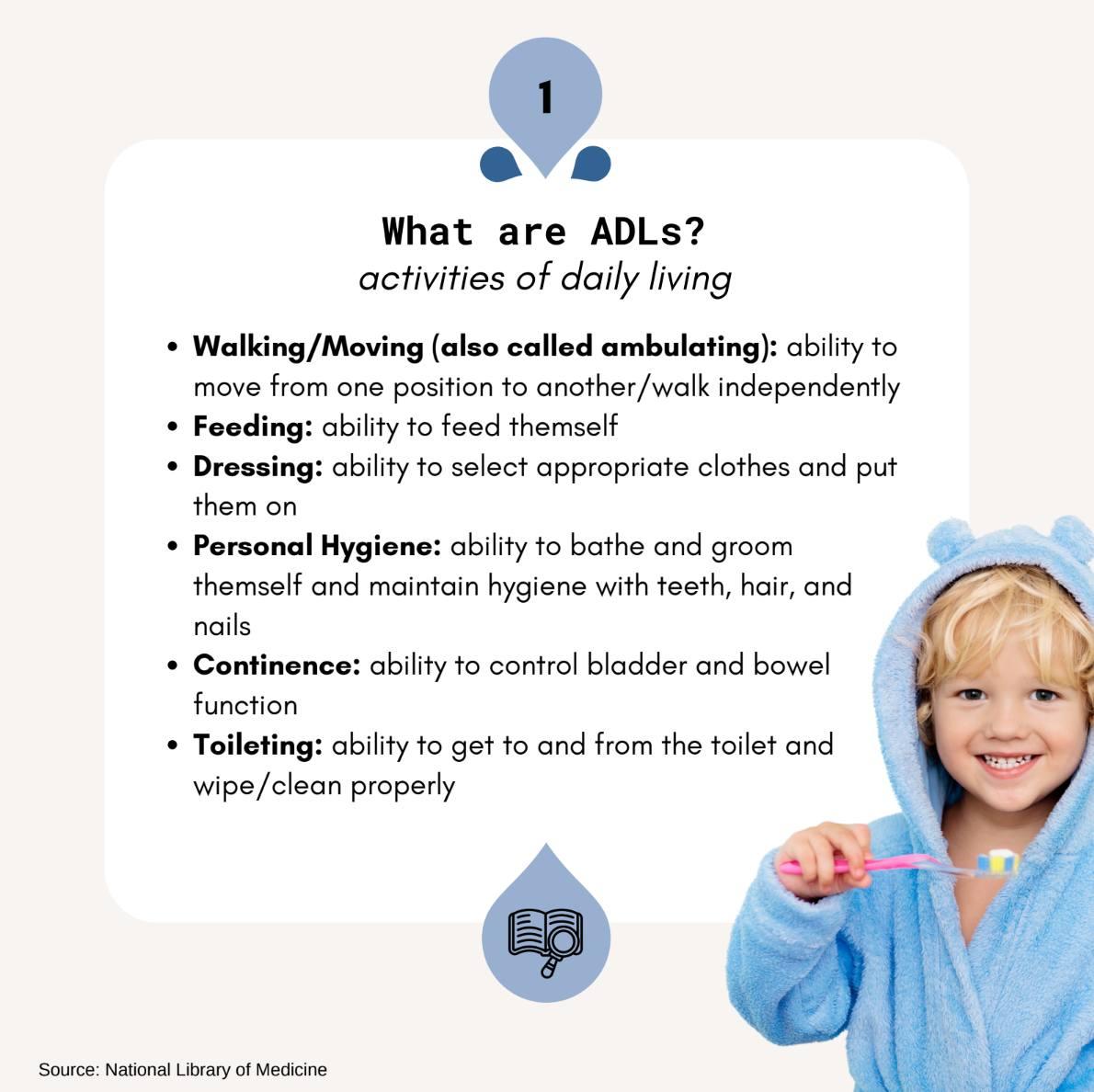
While many children continue to grow and develop these ADLs naturally, it’s not uncommon for them to need support in one or more activities of daily living.
The team at Beyond Boundaries Therapy is here to help if you and your child need extra support in developing any of these skills.
Common ADL Milestones
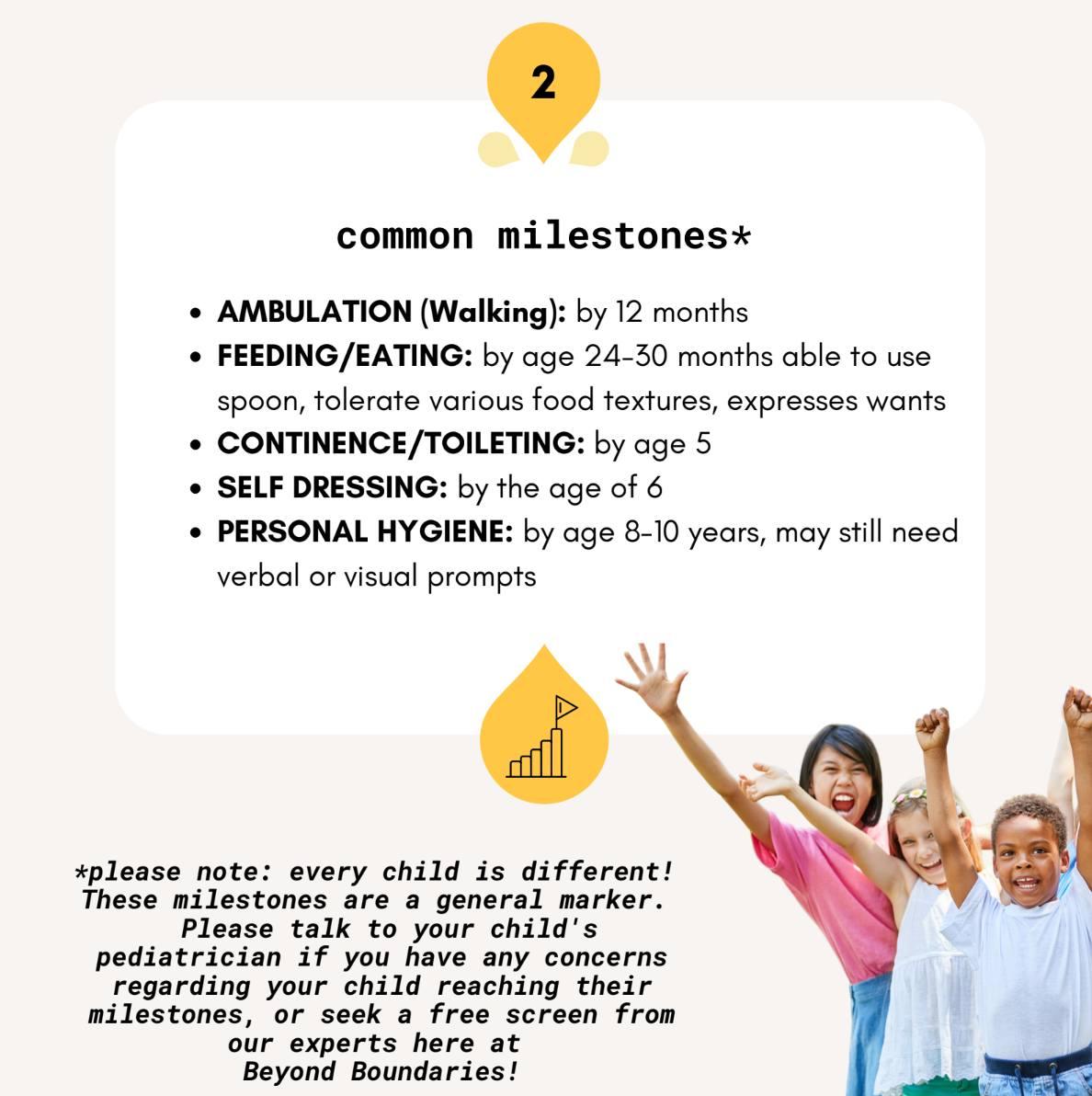
While each child will gain ADL skills at different rates, there are general guidelines to follow to determine when intervention may be needed.
- Walking: by 12 months
- Feeding/Eating: by age 24-30 months they should be able to use a spoon, tolerate various food textures, and express food wants
- Toileting: by age 5
- Self dressing: by the age of 6
- Personal hygiene: by the age of 8-10 years, but they may still need verbal or visual prompts
A Team Approach to ADL Skills
Occupational Therapists (OTs), Speech-Language Pathologists (SLPs), and Physical Therapists (PTs) all have roles in developing the skills needed for ADL success.
The first step is to collaborate with parents and children to determine their goals (for example, feeding themselves with a spoon, using the toilet on their own, etc.). Then the type of support needed is determined.
Occupational Therapy
With young children, OTs take these ADLs one step at a time. And for our little clients, we do this through play!
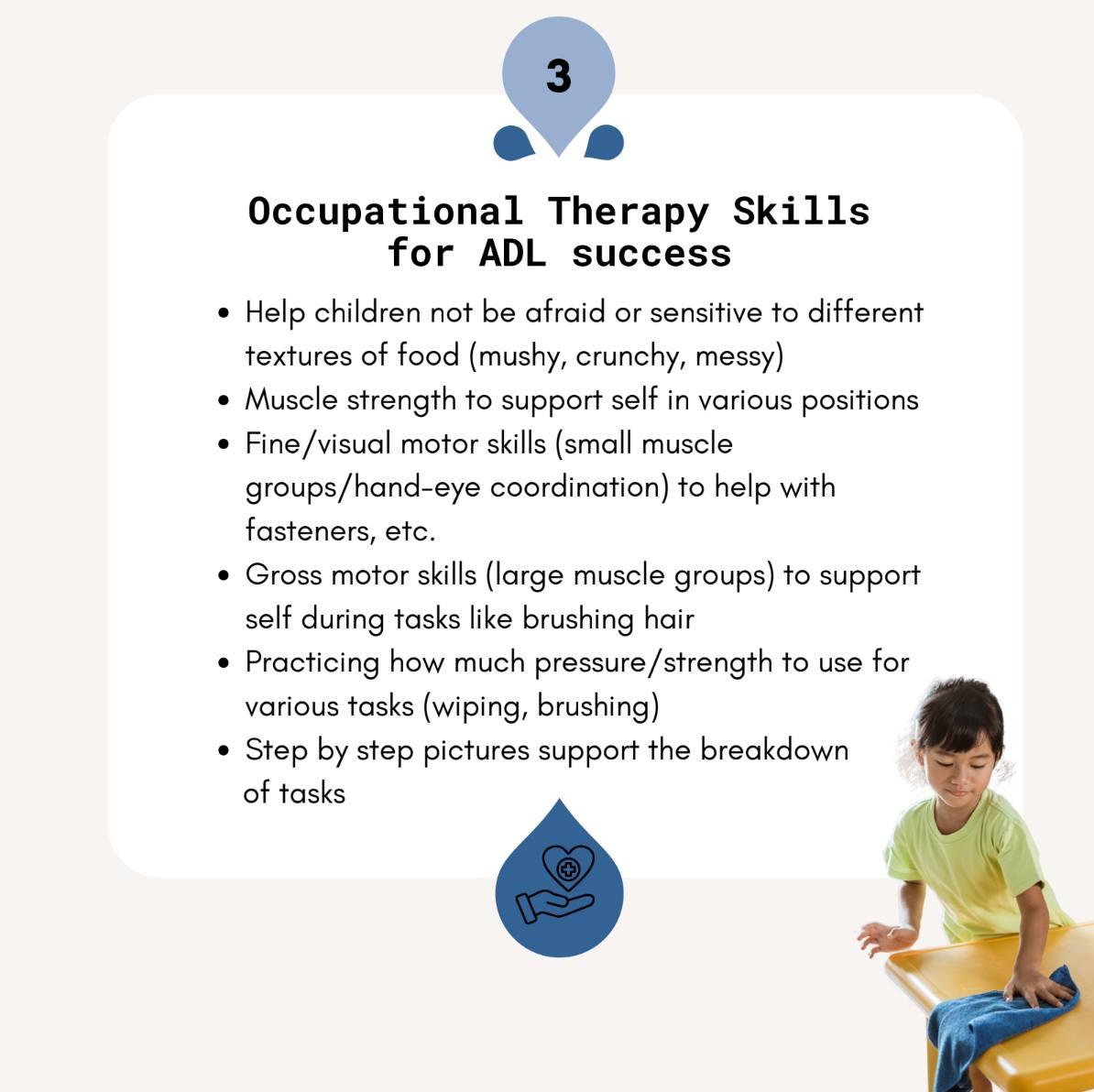
For example, a child who struggles to sit at a table may start with making a craft or playing a game at a table. Or, we may recommend parents incorporate some “calm-down” time before dinner through listening to music or taking deep breaths to help slow the body down.
Another example: if a child struggles with using a utensil you may see us coloring, using tongs to pick up small toys, or blowing bubbles. All of these are fun and engaging ways to help mature and strengthen the fine movements of the hand, in similar ways to the movements needed to use a fork or spoon.
Through stepping back and observing, we can see what exactly is keeping a child from completing these ADLs independently.
We examine the physical ability to coordinate their movements, the cognitive ability to put all of the ADL’s steps in order, and the sensory ability to slow their body down enough to efficiently complete ADLs. Then, we plan interventions to target the skills needed, or to create adaptations that can further support the child’s independence.
Speech Therapy
There are numerous speech-language skills involved for ADL success.
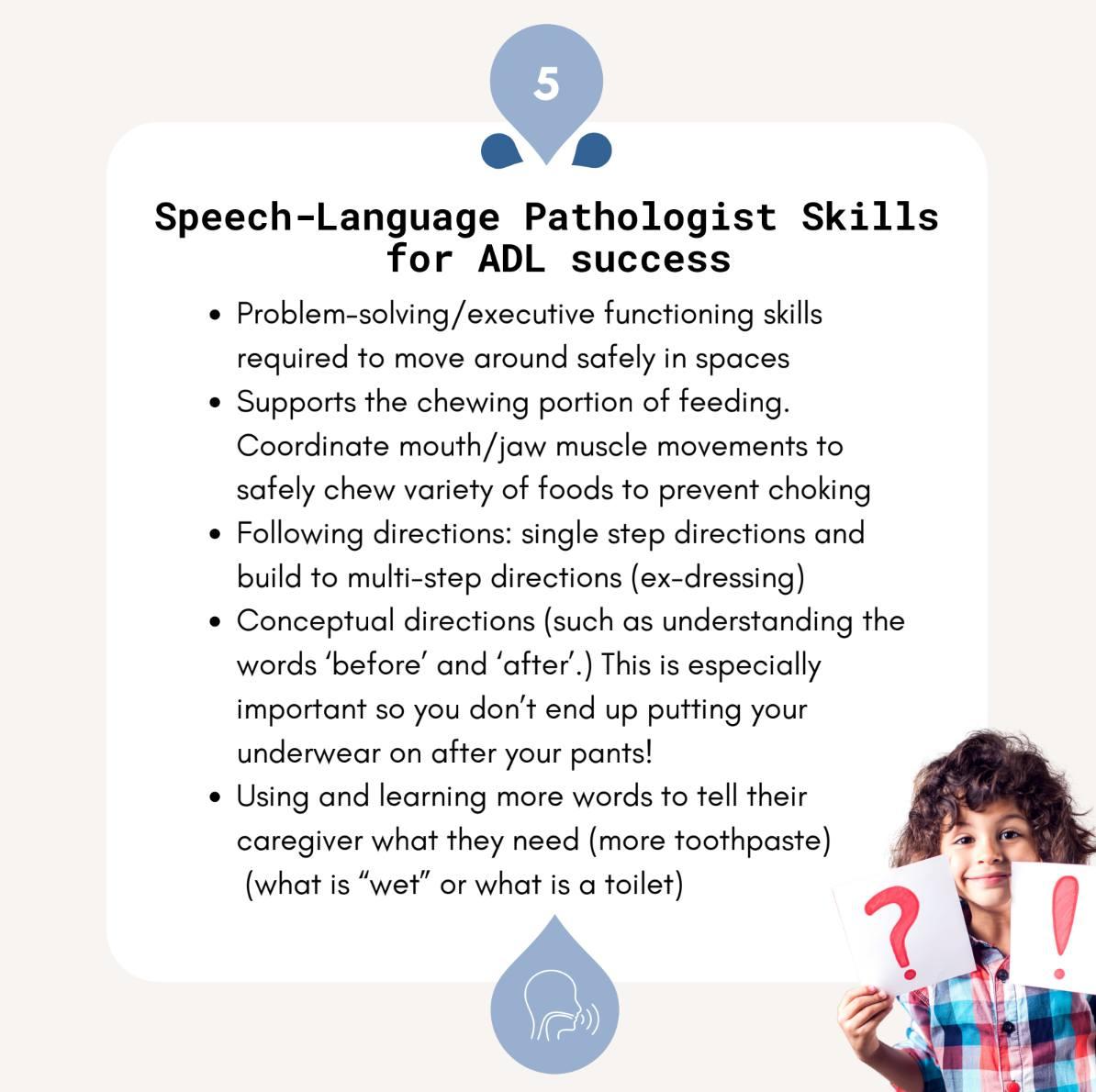
One skill is the ability to follow directions. Specifically, understanding concepts such as “before” and “after.” This goes along with executive functioning because it’s involved in planning and completing tasks.
By age three, your child should be able to follow two-step directions such as, “Pick up the ball and put it in the basket.”
By age five, children should understand words for order such as first, next, then, etc. They should also be able to follow longer, more complex three-step directions.
Additionally, learning to communicate wants and needs is an essential skill when performing ADLs. For example, your child may need assistance reaching the sink to rinse their toothbrush. Or, the pajamas you laid out for them to put on may be too tight. Maybe they want more fruit. Whatever it may be, it’s important that they are able to communicate with you.
Speech-language therapists also help children build feeding skills. While it is common for toddlers to gag and cough while learning to eat food, if it becomes frequent and/or is taking the joy out of mealtime, SLP can help teach safe chewing, swallowing, and food presentation.
Physical Therapy
While ADLs commonly fall into an OT’s wheelhouse, physical therapists work on physical mobility by encouraging the child to be as independent as possible during the targeted task.
They also problem solve ways to make the task easier so that the child can be successful. It won’t look the same for every child, but PTs are able to break down the movements needed to accomplish the task and then practice that task in a variety of different ways. This allows the child to challenge and improve their strength, balance, range of motion, or whatever is needed.
The best ways to facilitate ADL and physical development is to let them be kids! But also by encouraging them to start to do things on their own. This includes helping them climb up into their car seat, jumping down from curbs, or supervise as they get dressed (it’s ok if they put their pants on backwards!). It’s also ok if they struggle a little bit or it takes them a little longer to finish, you are still there to help and give hugs when needed.
Every child is unique, and that is awesome! Encourage your normally hesitant child to be brave and climb to the top of jungle gym, maybe even climb up the sliding part of the slide. (I know most would say taboo, but it is PT approved!) Or, encourage your normally wild child to slowly and purposely control their body while playing.
Some other favorite PT approved whole body movement activities are:
- Jumping! – e.g. jumping over, jumping down, jumping forward, frog jumps, hopping on one foot
- Yoga for kids
- Rolling across the floor
- Animal walk relay races
- Chalk obstacle course
- “Floor is Lava” obstacle course
- Dance parties
- Swimming as a family
- Riding bike
When Should I Seek Help?
Knowing where your kid should be in terms of how independent they are in their ADLs is a complex topic. There are general milestones to follow (see above), but each child is different in when they reach them!
At Beyond Boundaries, we offer free screenings — with no referral needed — if you do have concerns about your child’s ability to care for themselves or reach certain milestones.
Even if they are still too young to achieve ADLs independently, it’s a good idea to check in on how they tolerate you helping them. Does your child consistently have strong reactions to you brushing their teeth? Or, do they do everything they can to stay out of the bathtub? These can be signs that their sensory system could be processing the world differently than others.
ADL Support at Beyond Boundaries
Activities of daily living can be overwhelming for some families, but it does not have to stay that way. If you have any questions or concerns about your child’s ability to participate in their own ADLs, reach out to our team at Beyond Boundaries Therapy Services at 701-356-0062, or request a free screening at www.beyondboundaries.us.







